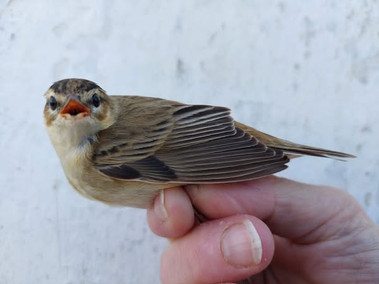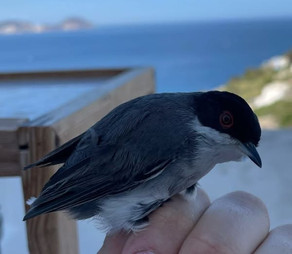A Week of Transition: Between Rain, Migration Peaks, and New Species
- aleliu
- Apr 6
- 2 min read

The week just ended has been a real meteorological rollercoaster, clearly reflected in the migratory movements of birds. After an uncertain start marked by persistent rain and few captures, a turning point finally arrived with the return of fine weather… and, consequently, the first real signs of migration!
The first few days, between the end of March and the beginning of April, were characterised by unstable weather and low activity. A few more swallows compared to previous days, a rare Water Rail (Rallus aquaticus) for Ponza, and the first Whinchat (Saxicola rubetra) of the season were among the few highlights of a rather slow period. The persistent grey skies seemed to have put migration on hold.
From 3 April, with the return of the sun, the situation changed dramatically. At last, a noteworthy wave of migrants reached the island, dominated by Willow Warbler (Phylloscopus trochilus) and Subalpine Warbler (Curruca cantillans). In a single day, around 350 birds were ringed, and one of the local Sardinian Warblers (Curruca melanocephala), originally ringed years ago, was retrapped — a delightful surprise that confirms the species' site fidelity.
The positive trend continued for two more busy days, with several new seasonal arrivals such as Rock Thrush (Monticola saxatilis), Wood Warbler (Phylloscopus sibilatrix), Sedge Warbler (Acrocephalus schoenobaenus), Garden Warbler (Sylvia borin), and Collared Flycatcher (Ficedula albicollis) — our symbolic species! There were also special moments, like the retrap of a Willow Warbler originally ringed in Helgoland, Germany – a clear confirmation of the European network connecting ringing stations.
On Sunday 6 April, poor weather made a return, slowing down captures (around 100 individuals), yet still leaving room for one final thrill: the season's first Ring Ouzel (Turdus torquatus). Subalpine Warblers and Pied Flycatchers remained the most abundant species, even under less favourable conditions.

In summary, this week on Ponza saw a gradual shift from a static, rainy phase to an acceleration in migration, culminating in the arrival of several new species. Weather remains a key factor, but if favourable conditions persist, we expect many more surprises to come. Stay tuned!























Comments